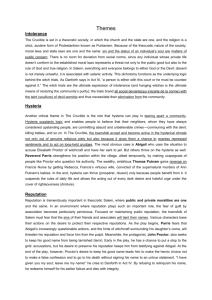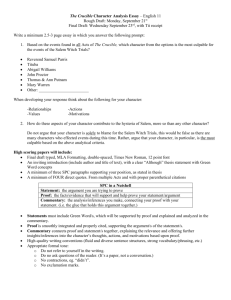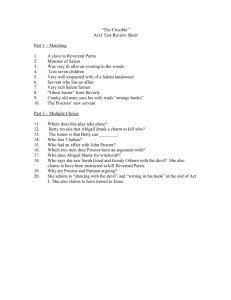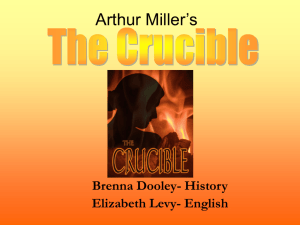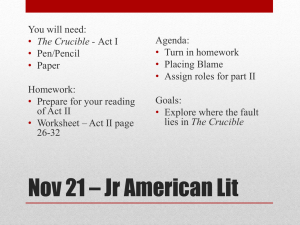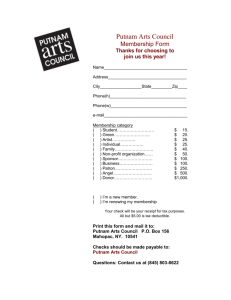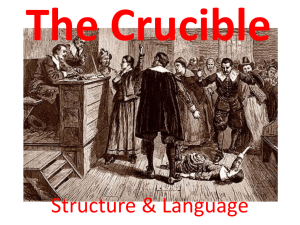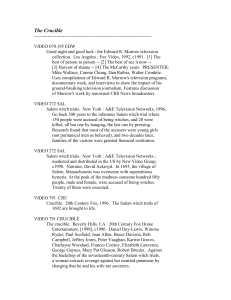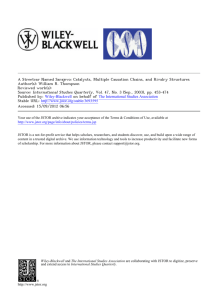The Crucible: Individual Power Essay Assignment
advertisement
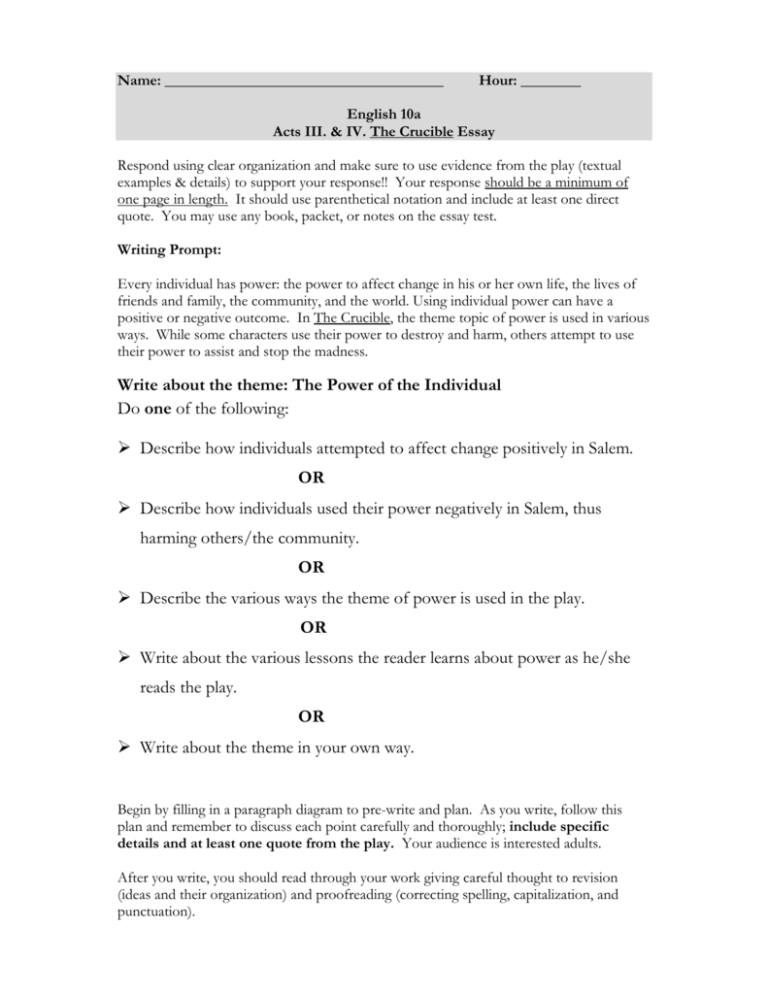
Name: _____________________________________ Hour: ________ English 10a Acts III. & IV. The Crucible Essay Respond using clear organization and make sure to use evidence from the play (textual examples & details) to support your response!! Your response should be a minimum of one page in length. It should use parenthetical notation and include at least one direct quote. You may use any book, packet, or notes on the essay test. Writing Prompt: Every individual has power: the power to affect change in his or her own life, the lives of friends and family, the community, and the world. Using individual power can have a positive or negative outcome. In The Crucible, the theme topic of power is used in various ways. While some characters use their power to destroy and harm, others attempt to use their power to assist and stop the madness. Write about the theme: The Power of the Individual Do one of the following: Describe how individuals attempted to affect change positively in Salem. OR Describe how individuals used their power negatively in Salem, thus harming others/the community. OR Describe the various ways the theme of power is used in the play. OR Write about the various lessons the reader learns about power as he/she reads the play. OR Write about the theme in your own way. Begin by filling in a paragraph diagram to pre-write and plan. As you write, follow this plan and remember to discuss each point carefully and thoroughly; include specific details and at least one quote from the play. Your audience is interested adults. After you write, you should read through your work giving careful thought to revision (ideas and their organization) and proofreading (correcting spelling, capitalization, and punctuation). Example Student Essay Prompt: Discuss the role that grudges and personal rivalries play in the witch trial hysteria. In Arthur Miller’s classic drama, The Crucible, grudges and personal rivalries play a key role in the witch trial hysteria. To begin, one must examine the historical background of the play in order to understand the grudges and rivalries. The trials in The Crucible take place against the backdrop of a deeply religious and superstitious society, and most of the characters in the play seem to believe that rooting out witches from their community is God’s work. However, there are plenty of simmering feuds and rivalries in the small town that have nothing to do with religion, and many Salem residents take advantage of the trials to express long-held grudges and exact revenge on their enemies. On example is the teenage antagonist Abigail Williams. She is the original source of the hysteria and has a grudge against Elizabeth Proctor because Elizabeth fired her after she discovered that Abigail was having an affair with her husband, John Proctor. As the ringleader of the girls whose “visions” prompt the witch craze, Abigail happily uses the situation to accuse Elizabeth and have her sent to jail. As she declares in open court, “I have been hurt, Mr. Danforth; I have seen my blood runnin’ out! I have been near to murdered every day because I done my duty” (219). She falsely accuses poor Elizabeth and goes so far as to lie under oath and stab herself with a needle in the stomach; she will stop an nothing to get John. Meanwhile, Reverend Parris, a paranoid and insecure figure, begins the play with a precarious hold on his office, and the trials enable him to strengthen his position within the village by making scapegoats of people like Proctor who question his authority. Furthermore, among the minor characters, the wealthy, ambitious Thomas Putnam has a bitter grudge against Francis Nurse for a number of reasons: Nurse prevented Putnam’s brother-in-law from being elected to the Salem ministry, and Nurse is also engaged in a bitter land dispute with Putnam. In the end, Rebecca, Francis’s virtuous wife, is convicted of the supernatural murders of Ann Putnam’s dead babies. Thus, the Putnams not only strike a blow against the Nurse family but also gain some measure of twisted satisfaction for the tragedy of seven stillbirths. Overall, this bizarre pursuit of “justice” typifies the way that many of the villagers approach the witch trials as an opportunity to gain the ultimate satisfaction. The simmering resentments, feuds, and grudges are resolved by people like Abigail, Rev. Parris, and Thomas Putnam convincing themselves that their rivals should be brought to justice once and for all.


